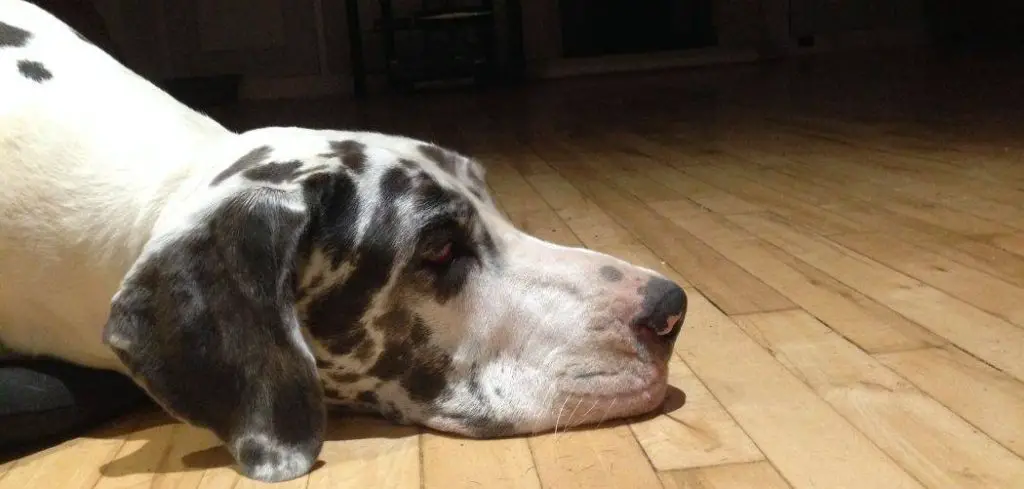Seeing an old dog collapse and poop at the same time is one of the most distressing situations for any dog owner.
This sudden loss of control often signals a serious medical emergency that should never be ignored.
We outline the common causes of collapse and loss of bowel control in old dogs, what you can do at home, and when to seek veterinary help.
Old Dog Collapsed and Pooped — Why It Happens
When an old dog collapses and poops at the same time, it usually means the body has lost control of both strength and the muscles that regulate the bowels. This may be caused by fainting due to heart disease, a seizure, a neurological condition, or even shock from severe illness.
Sometimes gastrointestinal distress can overwhelm the body, leading to collapse during defecation.
Because this symptom points to a sudden breakdown in normal body function, it should always be treated as urgent.

Old Dog Collapsed and Pooped: Common Causes
Heart Disease and Fainting
Many senior dogs develop heart problems such as congestive heart failure or arrhythmias. When the heart cannot pump enough blood to the brain, the dog may faint (syncope) and collapse.
During this event, loss of muscle control can cause stool to pass involuntarily. You may notice heavy breathing, coughing, or a bluish tongue before or after the collapse.
Heart-related collapse is serious and requires immediate veterinary care, as it can signal advanced disease or risk of sudden death.
Read more: Old Dog Pooping Blood and Mucus (Explained)
Seizures
Seizures are another common reason an old dog may collapse and poop unexpectedly. When the brain experiences abnormal electrical activity, the body convulses, and bowel or bladder accidents are common.
Seizures can be linked to epilepsy, brain tumors, toxins, or metabolic conditions such as liver disease. Affected dogs may stiffen, paddle their legs, or appear confused before or after the event.
Any seizure in an old dog warrants urgent evaluation, especially if collapse and pooping occur together.
Neurological Disorders
Spinal cord injuries, degenerative myelopathy, or other neurological problems can cause sudden weakness or paralysis.
If the nerves controlling the hind end fail, an old dog may collapse while also losing bowel control.
This often appears alongside wobbling, dragging paws, or difficulty standing. While some neurological issues progress slowly, sudden collapse requires rapid assessment.
Prompt care may slow progression or improve quality of life, depending on the cause.
Shock or Severe Illness
Collapse accompanied by loss of bowel control can also happen when the body is overwhelmed by shock or systemic illness. Conditions like internal bleeding, organ failure, or poisoning may cause such a dramatic response.
In these cases, the collapse is often accompanied by pale gums, weakness, vomiting, or labored breathing. The dog may appear extremely lethargic and unable to recover quickly.
This is a medical emergency requiring immediate intervention.
Heatstroke
Older dogs are especially vulnerable to overheating, particularly in hot weather or poorly ventilated environments. Heatstroke can cause collapse, disorientation, and loss of bowel control as the body overheats and organs begin to fail.
You may notice excessive panting, drooling, or weakness before the collapse. Without quick cooling and veterinary treatment, heatstroke can be fatal.
Gastrointestinal Emergencies
Sometimes severe gastrointestinal distress—such as bloat (gastric dilatation-volvulus), intestinal blockage, or acute gastroenteritis—can trigger collapse.
When pressure builds up inside the body or extreme pain strikes, dogs may collapse while defecating, often losing control of stool in the process. These emergencies progress rapidly and should be treated as life-threatening.
What to Do If Your Old Dog Collapsed and Pooped
If your old dog suddenly collapses and poops, remain calm but act quickly. First, ensure your dog is breathing and responsive. Do not attempt to move them unless necessary for safety.
If your dog regains consciousness within moments, call your veterinarian immediately and describe what happened. Even a brief collapse can indicate a serious underlying condition.
At home, keep your dog comfortable on a soft surface, away from stairs or hazards. Offer water once they are stable, but do not force food or drink. Monitor their breathing, gums, and ability to stand.
Do not wait for another episode. Collapse with bowel loss is never normal in old dogs and always requires urgent veterinary attention.
When to Call or Visit Your Vet
Collapse paired with pooping should always be considered an emergency. You should seek veterinary care right away if your dog:
Loses consciousness or remains weak after collapsing.
Shows signs of seizure activity, such as twitching or paddling.
Has pale or blue gums.
Struggles to breathe or has a rapid heartbeat.
Shows signs of pain, bloating, or vomiting.
Even if your dog seems to recover quickly, an exam is essential to determine the cause. Early intervention may prevent a fatal event and improve your old dog’s quality of life.
Read more: Old Dog Pooping and Peeing in House at Night (Causes explained)
Key Takeaway
An old dog collapsing and pooping at the same time is never a harmless event. It often signals a critical problem such as heart disease, seizures, neurological issues, or systemic illness.
While it can be frightening to witness, quick action can make all the difference. Contact your veterinarian immediately, monitor your dog closely, and follow up with ongoing care tailored to the underlying cause.
With timely treatment and support, many old dogs can still enjoy comfort and stability despite serious health challenges.
